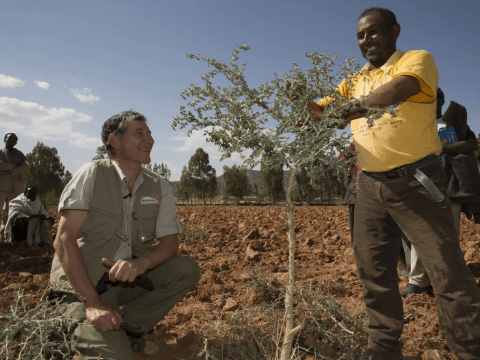Simple tree restoration method could provide up to 25% greenhouse gas emission reduction by 2030

- Restoring tree cover can provide up to 25% of emission reductions needed before 2030
- FMNR is a method of restoring landscapes and re-growing trees that improves soil and food security, restores livelihoods, and mitigates climate change
- Implemented in 27 countries, Farmer Managed Natural Regeneration (FMNR) has restored at least 1 million hectares in World Vision programmes alone and its techniques are replicable and scalable
- Empowering farmers to implement FMNR on local and national levels can help implement the promises leaders make at COP27
EMBARGOED UNTIL 15:00 CET
16 November, 2022 - An award-winning agronomist today called for all governments to invest in a proven and hugely successful nature-based solution to the impact of climate change: Farmer Managed Natural Regeneration (FMNR).
At a COP27 side event and report launch, World Vision's Tony Rinaudo said restoring forests on one billion hectares of degraded land could drawdown 16-25% of existing greenhouse gases while empowering communities and local economies. World Vision led the event with the Rainforest Alliance, and 1000 Landscapes for 1 Billion People.
Speaking at the launch of the “Restore Land, Restore Climate” report, Mr. Rinaudo urged governments to invest in FMNR, a method of restoring landscapes and re-growing trees that improves soil and food security, restores livelihoods and mitigates climate change. In World Vision programmes alone over 1 million hectares of land have been restored.
"Farmer Managed Natural Regeneration has proven successful in more than 27 countries and this landscape restoration can continue by putting communities front and centre,” said Tony Rinaudo, Principal Climate Change Advisor for World Vision Australia. “By promoting favourable policies that empower and enable farmers and communities to sustainably manage their land, vegetation and natural biodiversity, FMNR can be scaled up where it is needed most.”
He added, "Given the huge return on investment for countries, national leaders would be foolish not to consider investing in this approach to mitigating climate change and boosting local economies."
There is no single answer to the climate crisis, but World Vision’s Farmer Managed Natural Regeneration (FMNR) is a method of re-growing forests that improves soil, restores livelihoods, and mitigates climate change. It has proven successful in restoring lands in Australia and Africa, increasing sequestration of carbon, and its techniques are replicable and scalable.
As a solution to the climate crisis, FMNR is an evidence-based approach of re-greening degraded landscapes that involves the selection and management of trees and shrubs growing from living stumps and seeds to achieve rapid, low-cost, and scalable rehabilitation of degraded land.
“Niger is one of the most affected countries by climate change and land degradation. However, we have an effective, easily applicable, and cost-effective solution in Farmer Manage Natural Regeneration,” said Hamed Constantin Tchibozo, Manager of World Vision’s Regreening Africa Project in Niger. “Nature-based solutions, like FMNR, have shown effective and sustainable results when adopted by farmers, communities, and youth, and applied consistently at local and national levels.
A community-based approach that links livelihood improvements with ecosystem restoration provides a clear and proven pathway to scale up FMNR. Looking at problems at the scale of tens or hundreds of thousands of hectares can help FMNR contribute significantly to climate change mitigation and adaptation efforts.
“Smart natural carbon-trapping solutions like FMNR could be a powerful tool to avoid or adapt to climate change,” said Corinne Moser, Rainforest Alliance Senior Advisor for Landscapes and Communities. “It’s critical to operate these kinds of actions at the scale of whole landscapes to achieve real impact, and the best way to do that is through partnerships like those championed by 1000 Landscapes for 1 Billion People.”
“It is vital that leaders at COP27 hear the voices of children affected by climate change,” said Tony Rinaudo, Principal Climate Change Advisor for World Vision Australia and pioneer of FMNR. “World Vision is at COP27 to ensure action and to share one of our great solutions – Farmer Managed Natural Regeneration, a tool for regreening entire landscapes. All governments should invest in FMNR, a nature-based solution that supports the needs of the world's most vulnerable communities, to bring hope to children and future generations.”
ENDS
For additional questions, please contact Susannah Cernojevich, Communications Lead for World Vision International at COP27 via Susannah_Cernojevich@wvi.org or +1 202 276 2322.
To schedule an interview with Tony, please contact Silvia Holten on +49 175 2959758
Notes to Editors
- Read World Vision’s new report: Restore Land, Restore Climate
- Read more about World Vision’s attendance at COP27 here and its work on mitigating climate change here
World Vision is a Christian humanitarian organisation dedicated to working with children, families and their communities to reach their full potential by tackling the root causes of poverty and injustice. World Vision serves all people, regardless of religion, race, ethnicity or gender. For more information, please visit www.wvi.org or follow us on Twitter @WorldVision